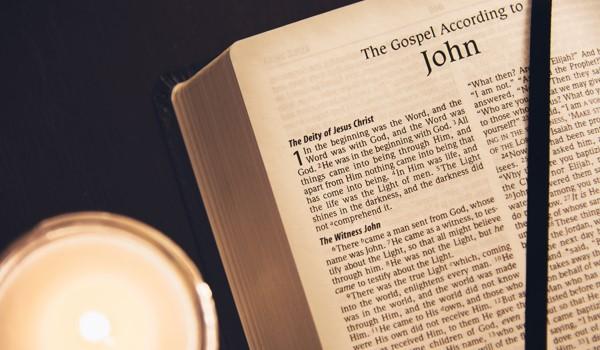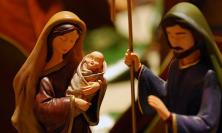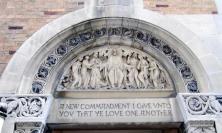The Catholic Bishops’ Conference of England and Wales have dedicated 2020 to be a year of focus on the Bible and ‘The God Who Speaks’. The prologue from John’s Gospel is read on Christmas day and famously speaks about ‘the Word’, and throughout Advent we have prepared to hear this familiar text in a new way at this beginning of the ‘Year of the Word’. David McLoughlin leads us through, between and beyond the language of John’s opening words, so that this Christmas we might hear it anew as an invitation to share in the life of the Word made flesh.
We in the United Kingdom have just come through an election process marked by debates and arguments, some ferocious and lacking in any real attempt to see the other side’s point of view. In such an atmosphere, the first casualty is the use of language and the shared meaning of words. We find ourselves using the same words and being interpreted as saying quite different things. The story of the tower of Babel comes to mind (Gen 11:1-9). Perhaps this year more than most it is salutary to have this moment on Christmas morn to reflect on the very foundation of language and communication. At this apex of the Christmas season, we are invited to meditate not on wandering magi, inquisitive shepherds or singing angels, a worried Herod or a puzzled Joseph, but on the revealing and incarnation of the Word of God.
The opening eighteen verses of John’s Gospel are in the form of a beautiful poetic chant. It has something mesmeric about it, clearly from the world of worship and ritual. Yet it also serves to highlight effectively some of the evangelist’s key themes that will be filled out in the gospel narrative. But as a chant, the tone is hieratic and cool, meditative. One could imagine young zealous Essenes in the Qumran desert reciting this, or Gnostic student philosophers pondering it in the great library in Alexandria.
The hymn is rhythmic and solemn, and must have been well known and perhaps well loved in the early community of the beloved disciple. It might have had a calming effect similar to that of a beautiful Bach chorale sung by an Andrea Bocelli or a Bryn Terfel. But then all of a sudden the text is ripped open in short prose sentences, as though by a stretch of rap by Stormzy! The evangelist does a couple of contemporary riffs on the hymn and a whole new focus emerges, suddenly rooting the rather transcendental early part of the text in a very real and very brutal recent history. The original contemplative harmony is momentarily lost and the listeners are shocked into the new and unexpected. They are shocked out of a framework in which they have a secure place into a world whose meaning and purpose and centre is all to play for. The ‘rap’ changes everything, or at least sharpens the focus considerably.
Let’s look at some of the themes of the chant itself. The opening words: ‘In the beginning was the Word,’ echo the opening of the Hebrew scriptures: ‘In the beginning…God said…’ They introduce one of the richest religious ideas of all time – the Word of God. It is a concept that includes both the divine creativity and the desire of God to continue to communicate with the creation that God’s Word has brought into being. It is a clear statement of divine transcendence and omnipotence. The Word existed before all time and before anything came into being. And yet the Word is also the means of engagement with creatures and creation, is capable of being alongside and within the messiness of creation.
There is another echo here, of Moses’ encounter with God in the desert in the story of the burning bush (Ex 3:1-17). When Moses asks who is sending him to Pharaoh, the divine voice says, ‘Yahweh’ – translatable as: ‘I am who I am, I will be where I will be, and what I will be’. So, a God who can’t be imagined, defined, limited, taken for granted, assumed, etc. And Jewish, Christian and Muslim scholars, mystics and saints have struggled with that non-definition, to the point of madness, ever since. Here the non-parameters of the Word of God echo well the revelation of indefinable presence to Moses.
Light is mentioned in the midst of the obscuring dark that human fallibility all too often introduces into the divine simplicity. The words of St John Henry Newman’s poem come to mind:
Lead, kindly light, amid the encircling gloom,Lead thou me on;The night is dark, and I am far from home,Lead thou me on.The themes of light and darkness will be woven throughout the gospel, but always the light triumphs as a part of the first creation that humanity cannot destroy; the original divine blessing remains. We do not have to fear some equally powerful divine darkness. There is a confidence here that the divine light can and will always enlighten and restore the balance.
So the Word remains the source of all life but above all of humans, the chosen divine conversation partners, those who can freely respond to the Word.
The Word that comes towards us brings us into being, is prior to us, beyond us. We respond to it, we never encompass it or control it through habitual use or through mastery of language. Implicit here is the idea that all human language involves an excess, a circle of the unsaid, and a surplus of meaning, beyond anything we consciously say at any time. And if that is true of our everyday discourse, how much more is it true of the Word that is God's self-gift.
All language use involves an idea of space and distance within which words take on a resonance and meaning but are not exhausted of further meaning. Light and the truth invite a response; they do not demand or force it. The divine-human communication is a conversation involving freedom. But with this recognition comes the awareness of the lack of openness of some. ‘His own people did not accept him’: the echo here is of the treatment of the Jewish prophets across the ages called to speak God’s word to renew the original prophetic imagination of Abraham and Moses in new times and new circumstances. It is an echo of a history in which forces work to undermine the prophets’ word and work, so that those in power can remain so but always at a cost to the ordinary people and their access to the divine saving will.
By the middle part of the poem, the Word is clearly a person, the creator and the bearer of light. Indeed, ‘the Word made flesh’. In the theological and philosophical world of the first centuries, this idea was like a cluster bomb provoking multiple responses that would keep early Christianity intellectually busy for five hundred years.
What does it mean for the all-powerful creative Word of God to become one with that element that is inevitably bound for fragility, decay and dissolution, the flesh? In classical Greek thought, this would be a paradox that would have to be got over – either it wasn’t really the divine word or it wasn’t really human flesh, with enormous repercussion on either count. And with the use of ‘to camp among us’, we hear the re-echo and renewal of the Exodus generation’s experience of the presence of God’s glory among the wandering tribes as they left Egypt and walked to freedom and new life.
The message is clear – the presence of God is capable of being found wherever humanity on its journey through life encamps, however briefly, however long. Literally in tents, or in palaces, or flats and homes. And this incarnation – this enfleshing of God, God’s humanising – is all part of the original covenant plan full of kindness and truth, faithful loving kindness (the ‘Hesed we’emet’ of Exodus 34:6; what St Paul would call charis, ‘grace’). Not so much ‘stuff’ as a new space to inhabit where we might all live ‘in Christ’ – in light, in truth and in faithful loving kindness.
The prologue understands that the coming of the divine word has opened up a new space of grace and truth out of which humans are to live. The life they will share in this new space is that of the children of God – not like the Roman emperors who gave themselves that title; rather John’s ‘children of God’ are invited in faith to share the life of the Word made flesh, the Son of God, Jesus of Nazareth – now finally named in the penultimate verse. They receive this as ‘light and truth’, as re-establishing the original potential of the creation that the poet Gerard Manley Hopkins told us we had compromised:
And all is seared with trade: bleared, smeared with toil;And wears man’s smudge and shares man’s smell: the soilIs bare now, nor can foot feel, being shod. (‘God’s Grandeur’)The evangelist has the answer to Hopkins’ concern. Encounter with Christ, accepting his invitation to friendship, will lead us back into the space of light and truth, into the faithful loving kindness that is the message of creation and incarnation.
Let’s return to the breaks in this beautiful prayer chant, the ‘raps’. ‘Now there was sent by God a man named John…’ We are six verses in and this is the first name mentioned, and it is so famous a name it does not need a father’s name, or place name, to fix it. This community knew who John was and of his baptismal ministry. His terrible death at the court of Herod, to whose power he had courageously spoken truth, was universally reverenced. Members of the community were his disciples.
But note he is not referred to as the baptiser. He is ‘a man sent by God’ He is a divinely commissioned prophet sent to testify to the light. This is a huge statement. The one that many of the beloved disciple’s community reverenced above all others is in fact the pointer to the one, un-named yet, who opens up access to the divine light and truth, to the loving kindness we are all invited to share as creatures of the Creator and the chosen friends of God.
But the old pattern is duplicated. The prophet is not only ignored but rubbed out … although in the process he is re-born a martyr and remains the great pointer to life and truth for all time. And then suddenly we are back in the next part of our ruminative chant and the story of the incarnation unfolds, of the coming and encamping of God’s son. Then suddenly in verse 15 we get another rap, in which John the prophet makes a clear statement of the relevant status of the one to whom he is pointing. And in doing so he links this rap with the opening verse of our chant which states the pre-existence of the Word. And suddenly the inner divine life of God and the all-too-fallible and fragmentary details of human history are seen as entwined from beginning to end. And the faithful loving kindness of the Creator and covenant God is now named as Jesus Christ.
The Catholic Bishops of England and Wales have given us the year of 2020 as the ‘Year of the Word’ an opportunity for the Catholic community – with the help of other Christians, in particular Bible Society – to engage anew with the Word of God. And as if to affirm this, in these last weeks Pope Francis has given us a new celebration: the Sunday of the Word of God, to be celebrated on the third Sunday of the year. Our pastors invite us to a renewed celebrating of God’s Word – enriching our worshipping and spiritual community; a renewed sharing of God’s Word – enriching our teaching, formation and proclamation; and a renewed living of God’s Word – enriching our social action and outreach.
It is nearly 1600 years since Jerome produced the first accessible western translation of the Greek and Hebrew scriptures, effectively putting into the hands of all who could read, and who could gather others to listen, the dangerous living word of God. The text is as dangerous now as it ever was, and yet so few know its relevance.
Jerome famously wrote: ‘Ignorance of the Scriptures is ignorance of Christ.’ (Commentary on Isaiah (Nn.1.2: CCL 73, 1-3)) This Year of the Word invites all of us individuals, parishes, schools and communities, to engage with the Word of God anew so that we come to know better his Word made flesh, and to become his friends and disciples in a deeper way. If that is the fruit of our year then we, our communities and our world will be changed in all sorts of unexpected ways. And the circle of light and truth and of faithful loving kindness will spread in our midst.
David McLoughlin is Emeritus Fellow of Newman University, Birmingham.






